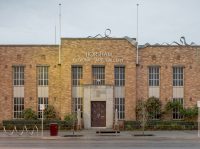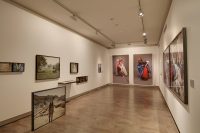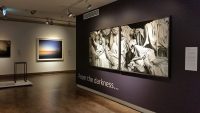
Introducing... Horsham Regional Art Gallery
14.11.19
Horsham Regional Art Gallery, in the north-west of Victoria, presents a program of contemporary exhibitions and public programs curated to engage and challenge the local Wimmera community and national and international visitors. Curator Alison Eggleton gives us an insight into the changing nature of photography and what we can expect to see in Horsham during the Festival.
What is the Gallery’s history of presenting photography exhibitions?
Since its inception in 1973, the Horsham Regional Art Gallery has specialised in the collecting and exhibiting of Australian photography. At this time photography was just beginning to gain recognition in Australia’s public galleries and Horsham lead the way by acquiring and exhibiting works such as Carol Jerrem’s Vale Street 1975 and Max Dupain’s Meat Queue 1946. Horsham’s photography collection has grown into one of national significance and contains over 1,500 historical and contemporary photographic works.
Photography exhibitions, based on the collection and external sources, have been a key component of Horsham’s exhibition program. A major group exhibition of significant Australian female photographers which grew from, and includes works from our collection, is currently touring Australia through a partnership with NETS (National Exhibitions Touring Support) Victoria. Titled In her words, by guest curator Olivia Poloni, the exhibition focuses on women behind and in front of the camera.
What are some notable photo-media artists you have worked with?
Horsham’s diverse exhibition programming has championed Australian photography through solo and group exhibition with Jane Brown, Janina Green, Jesse Marlow, Derek Kreckler, Hoda Asfar and very recently with Kent Morris presenting the Unvanished series.

In Her Words exhibition, curated by Olivia Poloni for Horsham Regional Art Gallery. Image by Luke Hobbs.
Why is it significant that PHOTO 2020 is taking place in Melbourne and regional Victoria?
Melbourne is the home of contemporary photography so it is no surprise that an international photography festival of this scale has evolved. The involvement of regional galleries within the PHOTO 2020 program is significant as it recognises the transformation in the perception of what regional galleries have to offer regional and metropolitan artists and audience. Everyone will benefit from the connectivity of artists and institutions through this partnership.
Why is the relationship between photography and truth important to investigate in the post-internet age?
The power of the photographer is not to only record but to frame an experience. In the post–internet age, the photographic image remains intimately connected with truth telling, always open to question and influenced by context, memory and the lived experience. The artist that Horsham will present for PHOTO 2020 plays with the photographic frame, exploring ways of seeing to understand her own truth of the lived experience.

From The Darkness..., curated by Alison Eggleton at Horsham Regional Art Gallery. Image courtesy of the Gallery.
In a time when most people own smart phones or cameras, how has the role of the photographer changed?
The accessibility and immediacy of the photographic image transcends social, culture and economic divides. Photographers have responded and embraced this as another means for conception and perception. It has not diminished the role of the artist, rather it has created another set of condition from which to understand the society in which we live.
What excites you the most about Horsham Regional Art Gallery being part of PHOTO 2020?
PHOTO 2020 puts a significant focus on photography and creates the platform for our gallery to develop a relationship with an international artist, something we have never done before. It is the opportunity to expand our gallery’s reach, to consider a global context and bring contemporary international photography to our visitors.
What can we expect from the Gallery during PHOTO 2020?
Horsham Regional Art Gallery will show the work an international female artist whose practice considers and questions the politics of place, family and cultural identity and how this intersects with personal experience.
The universal themes of the self and belonging will be explored in this solo exhibition through a series of photography, never before presented in its entirety, and through a new work that gives the exhibition its title. Her exciting multi-disciplinary practice of photography, installation, sculpture and photobooks will be exhibited across our ground floor gallery. Visits to Horsham and Melbourne will engage our community during the public programs held over the first few days of PHOTO 2020.
Alison Eggleton is curator at Horsham Regional Art Gallery. Alison has worked with Australian artists, public galleries and large art institutions to deliver a variety of contemporary art exhibitions and public programs for the gallery. In 2018 she undertook a curatorial residency at Rimbun Dahan Art Residency in Kuala Lumpur, Malaysia. In mid-2019 she begun practice led research to explore our relationship with Asia, through examining curatorial dialogue and exhibition making as frameworks for understanding approaches to the representation of race, trans-nationality and gender. The PHOTO 2020 exhibition will be the first of her curatorial explorations.